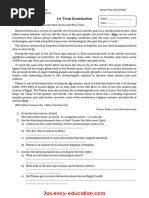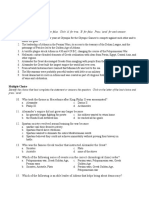Greeks Level LLE
Greeks Level LLE
Uploaded by
Hayet HoutaCopyright:
Available Formats
Greeks Level LLE
Greeks Level LLE
Uploaded by
Hayet HoutaOriginal Title
Copyright
Available Formats
Share this document
Did you find this document useful?
Is this content inappropriate?
Copyright:
Available Formats
Greeks Level LLE
Greeks Level LLE
Uploaded by
Hayet HoutaCopyright:
Available Formats
Larbi Ben M’Hidi secondary school level 3 L Ph
Topic I May 2016
Third Term Final Exam
Part 1 : Reading (14)
Read the text carefully then do the activities
Ancient Greece is called 'the birthplace of Western civilization'. About: 3000 years ago, the Greeks
created a way of life that other people admired and copied, The Romans copied Greek art and Greek gods, for
example. The Ancient Greeks tried out democracy, started the Olympic Games in 776 BC and left in science, art and
philosophy (thinking about life)
Ancient Greeks originate from the island of Crete; there lived a people now called Minoans. The name
comes from their King Minos who with other Minoan kings grew rich from trade, and built fine palaces. The Minoan
civilization ended about 1450 BC. After the Minoans came the Mycenaeans. They were soldiers from mainland
Greece, and were the Greeks who fought Troy (nowadays Turkey) and won the war thanks to the trick of "The
Wooden Horse” in the 1200s BC. After the Mycenaean age ended about 1100 BC, Greece entered a “Dark Age”.
This lasted until the 800s BC when the Greeks set off by sea to sell, explore, trade and set up colonies. That was the
start of "Archaic" Greek civilization that included mainland Greece, Greek Islander and the colonies scattered
through the Mediterranean Sea coast; there were Greeks in Italy, Sicily, Turkey, North Africa and as far west as
France. The Greeks took their way of life to many places. Around 480 BC the classical period or “Golden age” of
Greece began.
Ancient Greece had a warm, dry climate, as Greece does today. People fived toy farming, fishing, and trade, Some
were soldiers. Others were scholars, scientist, sportsmen or artists. Most Greeks lived in villages or in small cities.
There were beautiful temples with stone columns and statues; one of the ancient wonders was a statue of Zeus at
Olympia, made of gold and ivory by a Greek sculptor Phidias. This was placed inside a Temple, although it was a
towering 42 feet high, The Greeks constructed also open-air theaters where people sat to watch plays, Many
Greeks were poor, Life was hard because farmland, water and timber for building were all scarce. That's why many
Greeks sailed off to find new tends to settles.
There was not one country called "Ancient Greece." Instead, there were small “city-states”. Each city-state had its
own government, Sometimes the city-states fought one another; sometimes they joined together against a bigger
enemy, the Persian Empire. Athens, Sparta, Corinth, Macedonia and Olympia were five of these city-states. Only a
very powerful ruler could control all Greece. He was Alexander the Great, the king of Macedonia who did it in the
300s BC. His army not only conquered Greece but also an empire that reached as far as Afghanistan and India.
Adapted from BBC 2014 *Primary History” Ancient Greece
A/comprehension (07)
1 – The text is :
a) Argumentative b) narrative c) expository
2 - Are the following statements true or false:
a) The Greeks had a little influence on the Romans
b) The Myceneas defeated the Trojans in 1200 BC.
c) The Olympic Games started during the Dark Age.
d) The Greeks civilization spread to other territories;
3 – Answer the following questions according to the text
a) When did the Greek civilization flourish?
b) Did the Greek celebrate outdoor events? If yes, where?
c) Who unified Ancient Greece?
4- Give a suitable title to the text?
5) – What or who do the underlined words in the text refer to
a) Who (§2) =…………………… c) It (§4) =……………………………
B) Text exploration: (08)
1) – Find in the text words closest in meaning to the following:
a) Gathered (§2) =…………………… c) Abundant (§3) =……………………………
2- Which adjectives can be derived from the following words:
Words Trade Colony Art Sail
Adjectives
3- Combine the following sentences using the given connectors:
1. a- Ancient Greeks turned to the sea. Farmland and water were rare in Ancient Greece (because)
b- …………………………………………………………………………………………………………………………………………
2. a- Most of the Ancient civilizations were large empires. Ancient Greece was constituted of independent city-states
(unlike)
b- ……………………………………………………………………….……………………………………………………………………
3. a- Ancient Greece had few natural resources. The Greeks succeeded to develop a fascinating civilization (although)
b- ………………………………………………………..………………………………………………………………………………..
4- Classify the following words according to their number of syllables:
Lasted – colonies – civilization - reached
5- Re-order the following sentences to get a coherent paragraph:
a) They would use their intelligence and reasoning skills
b) One of the unique and wonderful of Greek inventions was philosophy
c) This means rather than using myths and stories to understand the world
d) Philosophy was the special way Greeks attempted to make a sense out the world, in a non-religious way.
Part II: writing: (5 pts)
Choose one of the following topics
Topic 1: Ancient Greece was one of the most fascinating civilizations of the past. Write an article about the major
accomplishments (achievements) of this civilization. You may use the following notes:
Developed philosophy and rational thinking.
Made discoveries in science and Astronomy / Established democracy
Developed fine arts and built temples
Developed sports (the Olympic Games)
Topic two: write a composition of about 80 words speaking about the major factors which contributed to the rise of ancient
civilizations.
You might also like
- World History I - SOL Review Packet AnswersDocument31 pagesWorld History I - SOL Review Packet Answerstack8783% (12)
- Savory Knitting Felix Pullover Amy ChristoffersDocument6 pagesSavory Knitting Felix Pullover Amy ChristoffersSilvia Rodriguez100% (3)
- Contemporary Philippine Arts From The Region: Quarter 2 - Module 1: Local Materials Used in CreatingDocument22 pagesContemporary Philippine Arts From The Region: Quarter 2 - Module 1: Local Materials Used in CreatingAmore Solo83% (6)
- Answer Key Handout Test Questions World History and Civilizations 1 & 2Document11 pagesAnswer Key Handout Test Questions World History and Civilizations 1 & 2Raymart Durin75% (4)
- Tokoname Bonsai Pots Catalog 2020 - ALLDocument24 pagesTokoname Bonsai Pots Catalog 2020 - ALLcricri doc94No ratings yet
- 2nd Periodical Exam - English 10Document5 pages2nd Periodical Exam - English 10Mae Sheilou Conserva Patero75% (36)
- Traditional Printing TechniquesDocument3 pagesTraditional Printing Techniquesapi-305818344No ratings yet
- Exam Papers For Third Year ClassesDocument21 pagesExam Papers For Third Year ClassesKouam AbdelkaderNo ratings yet
- ExamsDocument3 pagesExamsMilah TamNo ratings yet
- 3 Term English Final Exam: Level: 3 Year L/PH Duration: 2H30Mn Topic 1Document3 pages3 Term English Final Exam: Level: 3 Year L/PH Duration: 2H30Mn Topic 1Hayet Houta100% (1)
- English 3trim Foreign LanguagesDocument4 pagesEnglish 3trim Foreign Languagesام بناتيNo ratings yet
- 3ASL Tests CivilizationsDocument13 pages3ASL Tests CivilizationsSalahhhNo ratings yet
- Topic 2 The Development Of: European CivilisationDocument19 pagesTopic 2 The Development Of: European Civilisationcccnicky96No ratings yet
- Group of ExamsDocument12 pagesGroup of ExamsnesrineNo ratings yet
- AthensDocument6 pagesAthensShazil EjazNo ratings yet
- Civ WorksheetsDocument26 pagesCiv WorksheetsLarbi NadiaNo ratings yet
- 11 History SP 01Document15 pages11 History SP 01Ruchika GoyalNo ratings yet
- Greece Basic Facts WorksheetDocument5 pagesGreece Basic Facts WorksheetJackie McCarthyNo ratings yet
- eddirasa.com-الموضوع-رقم-9-اختبار-الفصل-الأول-لغة-إنجليزية-شعب-أدبية-ثالثة-ثانويDocument2 pageseddirasa.com-الموضوع-رقم-9-اختبار-الفصل-الأول-لغة-إنجليزية-شعب-أدبية-ثالثة-ثانويMohammed dhiyaeddine BelbeyNo ratings yet
- Ancient Civilizations1examsDocument9 pagesAncient Civilizations1examsHocine LemlikchiNo ratings yet
- I-Comprehension / Interpretation: PassageDocument4 pagesI-Comprehension / Interpretation: PassageAmine NeggaziNo ratings yet
- Ancient Greece Arhaic PeriodDocument4 pagesAncient Greece Arhaic PeriodteriseNo ratings yet
- First Term Exam of EnglishDocument2 pagesFirst Term Exam of Englishmaiche amarNo ratings yet
- History_EMDocument7 pagesHistory_EMvedaketshahaNo ratings yet
- Exam Simple1Document7 pagesExam Simple1Starr BlueNo ratings yet
- English 3lp18 1trim1Document2 pagesEnglish 3lp18 1trim1Abou DjihaneNo ratings yet
- Part One: Reading: 14 PointsDocument3 pagesPart One: Reading: 14 PointsKouam AbdelkaderNo ratings yet
- Third Year Languages ExamDocument3 pagesThird Year Languages Examعبد الكريم رحمونيNo ratings yet
- Grade XI - History - Term 1 - REVISION - Answer KeyDocument10 pagesGrade XI - History - Term 1 - REVISION - Answer Keyiraverma2No ratings yet
- Part One: Reading (14Pts) A) Comprehension (7Pts)Document9 pagesPart One: Reading (14Pts) A) Comprehension (7Pts)nour edhohaNo ratings yet
- History Revision Form One, 1 to 3Document5 pagesHistory Revision Form One, 1 to 3Abdifatah MohamedNo ratings yet
- Dzexams-3as-Anglais - EGYPT PDFDocument2 pagesDzexams-3as-Anglais - EGYPT PDFWassim TouitouNo ratings yet
- For First Semester G 12 Ancient GreeceDocument5 pagesFor First Semester G 12 Ancient GreeceHein Htet Aung100% (1)
- Question Bank Ancient Greece and RomeDocument3 pagesQuestion Bank Ancient Greece and Romemarupriyanka85No ratings yet
- 3 As Class Ancient CivilizationsDocument3 pages3 As Class Ancient CivilizationsAmine NeggaziNo ratings yet
- UNIT 10 Ancient GreeceDocument5 pagesUNIT 10 Ancient GreeceM Isabel Rodriguez RomeroNo ratings yet
- Culture and Values A Survey of The Humanities 8th Edition by Cunningham Reich Rathus ISBN Test BankDocument10 pagesCulture and Values A Survey of The Humanities 8th Edition by Cunningham Reich Rathus ISBN Test Banklisa100% (41)
- Ancient Egypt ExamDocument4 pagesAncient Egypt Examdebechemalak402No ratings yet
- EGYPTIAN CIV Reading and Writing NEWDocument3 pagesEGYPTIAN CIV Reading and Writing NEWⴽⴰⵃⵉⵏⴰ ⴽⴰⵃⵉⵏⴰNo ratings yet
- Grade 5 Ancient Greece Project IdeasDocument3 pagesGrade 5 Ancient Greece Project Ideasmtumenas100% (2)
- IR Summary (Lec.1)Document4 pagesIR Summary (Lec.1)7y6jttrd4xNo ratings yet
- Unit 01Document3 pagesUnit 01nait sidennas abdelghaniNo ratings yet
- Reading ComprehensionDocument4 pagesReading ComprehensionAl SalNo ratings yet
- Ancient Egypt New 2017Document6 pagesAncient Egypt New 2017anis18karimNo ratings yet
- Hema Higher Secondry SchoolDocument6 pagesHema Higher Secondry SchoolAnubhav SinghNo ratings yet
- Chapter 4 Review PacketDocument5 pagesChapter 4 Review PacketMatt Hasquin100% (2)
- 11 HISTORY HY 2024-25 FinalDocument6 pages11 HISTORY HY 2024-25 Finalcellexam2024No ratings yet
- Library Alexandria questionsDocument9 pagesLibrary Alexandria questionsxuanthao0712No ratings yet
- Dzexams 3as Anglais 144182Document5 pagesDzexams 3as Anglais 14418264q67rx6s6No ratings yet
- Midterm 1 HistoryDocument7 pagesMidterm 1 Historykisyokaevans87No ratings yet
- Ept Reading Comprehension Part 3Document1 pageEpt Reading Comprehension Part 3Dan Paolo AlbintoNo ratings yet
- Questions:: C. The Discovery of The Rosetta Stone Led To A Better Understanding of The History of EgyptDocument2 pagesQuestions:: C. The Discovery of The Rosetta Stone Led To A Better Understanding of The History of Egyptrosario lexterNo ratings yet
- Ancient Greece - UFCDocument4 pagesAncient Greece - UFCanis18karimNo ratings yet
- Ang 3asl D1 - 18 19Document2 pagesAng 3asl D1 - 18 19Zizo YassinNo ratings yet
- Ancient GreeceDocument31 pagesAncient GreeceAnisoara Marc100% (1)
- Ancient Greece UnitDocument73 pagesAncient Greece Unitapi-384517897No ratings yet
- History Vocabulary WorksheetDocument9 pagesHistory Vocabulary WorksheetMuhammad NadzirNo ratings yet
- Class 11 Sapmle PaperDocument22 pagesClass 11 Sapmle PaperANGELINA DESOUZANo ratings yet
- Mesoptomean, China Civilization Notes VI ModifyDocument9 pagesMesoptomean, China Civilization Notes VI Modifynishit bijakaNo ratings yet
- 11 History Eng PP 2023 24 2Document12 pages11 History Eng PP 2023 24 2malikshorya9No ratings yet
- Preguntas Sobre Historia en InglesDocument6 pagesPreguntas Sobre Historia en Inglesconin100% (1)
- Final Exam Ap 8Document5 pagesFinal Exam Ap 8Mariz Subong GandulinNo ratings yet
- WORLD - HISTORY - AND - CIVILIZATIONS - 1 - 2 - TEST With Answer KeyDocument6 pagesWORLD - HISTORY - AND - CIVILIZATIONS - 1 - 2 - TEST With Answer KeyDENNIS AFABLE100% (4)
- The Homeric Question Revisited: An Essay on the History of the Ancient GreeksFrom EverandThe Homeric Question Revisited: An Essay on the History of the Ancient GreeksNo ratings yet
- Bac blanc3LP 2Document2 pagesBac blanc3LP 2Hayet HoutaNo ratings yet
- 3rd Year LPH Exam2016Document2 pages3rd Year LPH Exam2016Hayet HoutaNo ratings yet
- Year 1 Lit. Class 2: P.S. Find Attached A Nice Photo of Me and My Family in Central ParkDocument2 pagesYear 1 Lit. Class 2: P.S. Find Attached A Nice Photo of Me and My Family in Central ParkHayet HoutaNo ratings yet
- Dzexams 1as Anglais TCST - d1 20200 875759Document4 pagesDzexams 1as Anglais TCST - d1 20200 875759Hayet HoutaNo ratings yet
- English 1as16 1trim2 PDFDocument2 pagesEnglish 1as16 1trim2 PDFHayet HoutaNo ratings yet
- El Ziania Secondary School 2019/2020 Level: 3: Year L & PHDocument2 pagesEl Ziania Secondary School 2019/2020 Level: 3: Year L & PHHayet HoutaNo ratings yet
- First Term Examination: 1450 Vanguard RDDocument3 pagesFirst Term Examination: 1450 Vanguard RDHayet HoutaNo ratings yet
- Y2-Tech&innov-Lamp - Doc Version 1Document4 pagesY2-Tech&innov-Lamp - Doc Version 1Hayet HoutaNo ratings yet
- Hirech Secondery School Third Year F.L. 2019/2020 Second Term Exam Two HoursDocument3 pagesHirech Secondery School Third Year F.L. 2019/2020 Second Term Exam Two HoursHayet HoutaNo ratings yet
- معضله الرياضيات فى بريطانيا-الاختبار الثانى.docx · version 1Document3 pagesمعضله الرياضيات فى بريطانيا-الاختبار الثانى.docx · version 1Hayet HoutaNo ratings yet
- Lesson 4 NOTESDocument38 pagesLesson 4 NOTESGino Achillez IINo ratings yet
- Elements of Fiction (English Grade 10)Document1 pageElements of Fiction (English Grade 10)imkyushio.0No ratings yet
- Tradition and Originality in El Greco's WorkDocument26 pagesTradition and Originality in El Greco's WorkMarika100% (1)
- PDFDocument32 pagesPDFmohammmed irshadNo ratings yet
- Mitered Granny Square Throw - Crochet Cozy Crochet Hoodie - CrochetDocument7 pagesMitered Granny Square Throw - Crochet Cozy Crochet Hoodie - CrochetadinaNo ratings yet
- Johana Toto Gallardo.: PrepositionsDocument2 pagesJohana Toto Gallardo.: PrepositionsAlondra GallardoNo ratings yet
- The Shadowrun Supplemental Issue 11Document44 pagesThe Shadowrun Supplemental Issue 11Jovis MayNo ratings yet
- Dance Etiquettes and Safety Annmarie CarolineDocument2 pagesDance Etiquettes and Safety Annmarie CarolineZildjian ApudNo ratings yet
- Unit 6B Music in The FamilyDocument3 pagesUnit 6B Music in The FamilyTú NguyễnNo ratings yet
- Standard Output RatesDocument48 pagesStandard Output RatesRobel TesfazgiNo ratings yet
- GRAPHIC dESIGN DIGITALDocument42 pagesGRAPHIC dESIGN DIGITALAleksandras ČapasNo ratings yet
- Mass Media Aman Ayaulym SRSDocument8 pagesMass Media Aman Ayaulym SRS42w5h49npjNo ratings yet
- MC DonaldDocument2 pagesMC DonaldJul BartolomeNo ratings yet
- IntroDocument23 pagesIntroNurnabihahMohamadNizarNo ratings yet
- kerusakan tabletDocument15 pageskerusakan tabletldyajengNo ratings yet
- Temporal Spasms Or, See You Tomorrow in Kiribati!: Daniel BirnbaumDocument3 pagesTemporal Spasms Or, See You Tomorrow in Kiribati!: Daniel BirnbaumBruno Yutaka SaitoNo ratings yet
- Tolkien Bibliography Tesis & ArticlesDocument4 pagesTolkien Bibliography Tesis & ArticlesMedardo Landon Maza DueñasNo ratings yet
- Clariant Brochure Guide Formulation Dispersing Agents For Label-Free Pigment Preparations 2018 ENDocument9 pagesClariant Brochure Guide Formulation Dispersing Agents For Label-Free Pigment Preparations 2018 ENJari Rene BrazNo ratings yet
- How To Wrestle - Instructions of Frank GotchDocument66 pagesHow To Wrestle - Instructions of Frank GotchDecameron100% (2)
- VITA 1925 1925E AKZENT Plus VA EN V05 Screen enDocument24 pagesVITA 1925 1925E AKZENT Plus VA EN V05 Screen enMarat GuseynovNo ratings yet
- Early Renaissance ArchitectureDocument11 pagesEarly Renaissance ArchitectureTazeem Ahmad Chishti100% (1)
- Using Bands To Create Technique Specific.15Document4 pagesUsing Bands To Create Technique Specific.15Hebert RezendeNo ratings yet
- DadaismDocument10 pagesDadaismGrace RoseteNo ratings yet
- Te Third Subject - Perspectives On Visual AntropologyDocument8 pagesTe Third Subject - Perspectives On Visual AntropologyEdu José MarínNo ratings yet
- Price_list_17_Oct_2024Document12 pagesPrice_list_17_Oct_2024wahidsyed779No ratings yet
- Semiology SacredmusicDocument39 pagesSemiology SacredmusicAntonio Tejero Pociello100% (1)



































































































